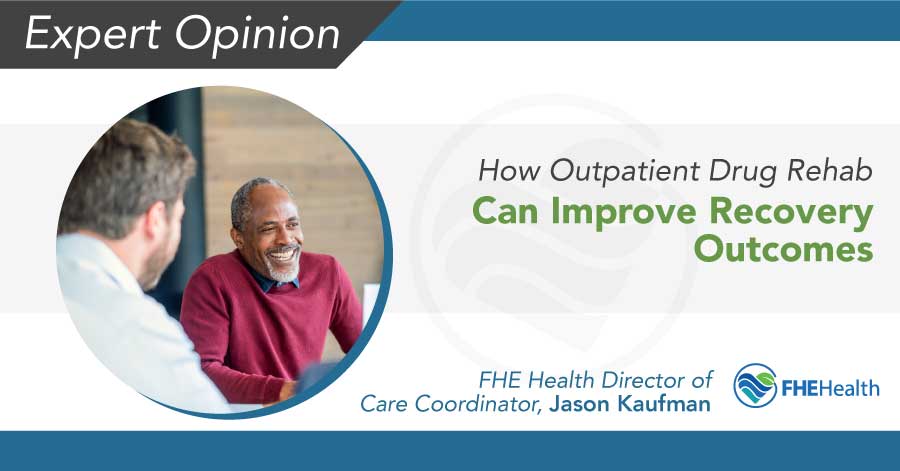
This article has been reviewed for accuracy by our peer review team which includes clinicians and medical professionals. Learn more about our peer review process.
Risks of relapse are much higher during the first year of recovery from drugs and alcohol. Yet there are also supports that help many people successfully stay sober (and are in fact critical to successful, long-term sobriety). Outpatient drug rehab is one of them. It’s actually the gold standard for treatment, ideally consisting of an IOP level of care (or “intensive outpatient program,” as a step down from inpatient rehab), followed by an aftercare program.
Just how important are IOP and an aftercare plan to better recovery outcomes? They’re “essential,” says FHE’s Director of Care Coordination Jason Kaufman. He would know. Kaufman’s role is to help our patients transition into an aftercare program and long-term recovery after intensive outpatient treatment.
In a recent interview, Kaufman described what is aftercare treatment and the IOP level of care. He also shared why a substance abuse aftercare plan is critical for every patient coming out of rehab; and, he discussed some of the ways that IOP and Aftercare in particular can improve outcomes, including promising data into outcomes that FHE has been collecting with the help of an independent third party (MAP Health Management).
What Is IOP Level of Care vs. Aftercare Treatment?
Typically, an IOP treatment program is designed as a step-down level of care for patients who have completed inpatient rehab (the most intensive, highly structured, round-the-clock level of care). Patients who transition from FHE’s inpatient rehab program into FHE’s IOP program continue to receive the same services (neurorehabilitation, psychiatric and medical supervision, specialized therapies, and ongoing individual psychotherapy), but in a scaled-back format: “for around three hours a day for five days a week,” Kaufman said, as opposed to all day, seven days a week.
The FHE Aftercare Program, by contrast, is “a support network in the early days of recovery that is patient-focused,” and “aftercare treatment is a long-term, patient-focused intervention.” And, Kaufman said, “There are different types, formats, and modalities of aftercare programs, such as group counseling, individual therapy, telehealth counseling, and self-help meetings.” In short, in a plan of aftercare, the emphasis is on “support in the early days of recovery.”
Kaufman said the length of Aftercare can vary, depending on the program. For example, sober living programs, often a feature of Aftercare, can last anywhere from six months to two years. One of Kaufman’s roles is to advise patients about what a sober living program is and provide them with trusted referrals. Of referrals in Florida— “we’ve personally vetted every sober living program that we refer to,” Kaufman said— and they have to be “FARR-certified” (certified by the Florida Association of Recovery Residences). Out-of-state, sober living referrals are typically only to programs certified by the National Association of Recovery Residences.
How an Aftercare Plan Can Prevent Relapse in Early Recovery
The high risks of relapse during the first year after treatment make “participation in a post-treatment after care program and consistency in an aftercare plan” vital, according to Kaufman, who noted that the “planning” for Aftercare begins as early as within the first 48 hours of a patient’s arrival in our Intensive Outpatient Program. That’s when Kaufman and his team start working with the patient to “identify and obtain objectives and goals to ensure a successful transition [into Aftercare].”
There’s quite a lot of work that goes into preparing patients for life after rehab and setting them up for success with the right support, in terms of therapy and other elements of Aftercare. Here’s how Kaufman described his work:
During the IOP phase, we’re finalizing that plan for Aftercare and making sure the patient has all of those appointments (medical check-ups, individual therapy sessions, etc.). We take directives from the clinical staff who make recommendations for the Aftercare plan. They’ll tell us the patient needs psychiatric follow-up, EMDR, sober living, etc., and we’ll take all that and run with it.
Kaufman compared the work to “laying the foundation for long-term success in recovery.”
It’s a collaborative, patient-centered process, but one that also includes our encouragement to enroll in MAP’s “Peer Recovery Support Services” program, according to Kaufman. He said the relatively new initiative is another way that FHE is prioritizing and tracking post-treatment and recovery outcomes.
How a New Aftercare Tool Benefits Recovery Outcomes
The benefits of enrollment in the MAP program are the additional layers of support and encouragement that MAP’s Peer Support Recovery Specialists provide.
“Patients connect with [their Peer Support Recovery Specialist (PSRS)] via weekly phone calls and [the PSRS is able to detect any signs of deterioration or relapse and provide “non-judgmental course correction that increases the probability of positive outcomes.” (Apparently, the statistics show that when there’s deterioration, patients in the program are more likely to get back into treatment— and more quickly.)
The commitment is “30-45 mins of weekly time with a Peer Recovery Specialist who asks [the patient] questions about whether they’re following aftercare recs, going to meeting, what meetings they’re going to, etc.”
There’s also” a 24-hour hotline for patients who need to reach out in the middle of the night,” Kaufman said. He cited research showing how the MAP Peer Recovery Support Services program has been improving recovery outcomes for patients around the country. Examples included:
- Reduced rates of relapse
- Increased retention in treatment
- Increased satisfaction with treatment
- And, for those with a dual diagnosis in the form of a co-occurring mental health disorder? Improvements in measures of recovery, quality of life, coping, relationships, and mental health symptoms
“MAP is all about outcomes and improving what we can do to better assist the patient and monitor their outcomes,” Kaufman said. That added layer of monitoring and support can be just what someone in early recovery needs to fend off a relapse.






